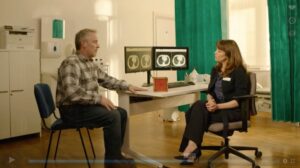NHS Launches New Campaign To Combat The Fear Of Cancer in the North West
 The NHS in the North West today joins with the health service across the country to launch a new campaign taking a radically different approach to detecting cancer early for patients, when it is easier to treat.
The NHS in the North West today joins with the health service across the country to launch a new campaign taking a radically different approach to detecting cancer early for patients, when it is easier to treat.
Running across TV, radio, and social media from Wednesday, the campaign is the first to focus on tackling the fear of cancer rather than specific symptoms.
Launching officially on Wednesday, the new advert shows a man worried about his symptoms carrying a jack-in-the-box, which he winds up as he goes about his day. When he eventually gets checked and discovers he doesn’t have cancer, a consultant opens the jack-in-the-box to show it is empty.
The campaign launches alongside new research showing that nearly 8 in 10 people (78%) in the North West are afraid of being diagnosed with cancer.
Almost two thirds (63%) of those surveyed in the region said dying was their biggest cancer fear, with more than one in three (37%) worried about being a burden on family and friends and over another third (36%) worried about the impact of chemotherapy or other treatments.
Thankfully, 75% also knew that finding a diagnosis early makes it more treatable, though over two fifths (41%) said they would ignore symptoms, wait to see if anything changed, look for answers online or speak to family and friends before seeing their GP.
The new campaign’s key message is that if you think something is wrong it is always better to get checked out to put your mind at rest, or to get treatment that maximises your chances of a good outcome.
The NHS and cancer charities are urging people not to delay lifesaving checks, highlighting that nine in ten of those checked turn out not to have cancer but that it is better to know so that people can get treated early when chances of survival are highest.
Speaking ahead of the launch, NHS North West Medical Director, Dr David Levy called on the public to keep coming forward for these vital checks, saying it is vital people try to set their mind at ease if they have worrying symptoms by getting checked without delay.
NHS North West Medical Director, Dr David Levy, said: “If you think you have symptoms that could be linked to cancer, it can be an incredibly daunting thing to think about what to do, not just for yourself but the implications for your family.
“As someone with a clinical background in cancer care, it’s good to see that so many people in the North West understand it’s important to get that diagnosis early. Equally it’s also possible you may be worrying unnecessarily, and you may have something that is less serious. Either way, what is important it to get checked.
“NHS staff have pulled out all the stops to ensure cancer was prioritised throughout the pandemic. The NHS is here for you so don’t let cancer play on your mind – get checked without delay.”
The NHS Long Term Plan committed to increasing the number of cancers detected at an early stage one or two from half to three quarters by 2028.
NHS staff have been checking record numbers of people for cancer. Latest figures show that the number of people getting checked for cancer increased by over half a million (512,110) in one year between December 2020 and December 2021.
 Clare Garnsey is the Greater Manchester Clinical Lead for Breast Cancer and Clinical Lead for Breast Services at Bolton NHS Foundation Trust, and appears in the video for this campaign, and said: “We know the prospect of receiving a cancer diagnosis can be daunting, but if you have symptoms you’re worried about, it’s important that you don’t put off seeking advice from your GP. In many cases, these won’t turn out to be cancer, but for those that do, we know that early diagnosis makes cancer much more treatable.”
Clare Garnsey is the Greater Manchester Clinical Lead for Breast Cancer and Clinical Lead for Breast Services at Bolton NHS Foundation Trust, and appears in the video for this campaign, and said: “We know the prospect of receiving a cancer diagnosis can be daunting, but if you have symptoms you’re worried about, it’s important that you don’t put off seeking advice from your GP. In many cases, these won’t turn out to be cancer, but for those that do, we know that early diagnosis makes cancer much more treatable.”
Cancers are much more likely to be treated successfully if caught at an early stage.
More than nine in 10 bowel cancer patients will survive the disease for more than five years if diagnosed at the earliest stage. Similarly, 92.8% of women diagnosed with the earliest stage ovarian cancer survive the disease for at least five years compared to around 13.3% for women diagnosed with the most advanced stage of the disease.
Not all the symptoms of cancer are easy to spot. The NHS is encouraging people to contact their GP practice if they experience any of the below symptoms:
- Tummy trouble, such as discomfort or diarrhoea for three weeks or more, or
- Blood in your pee – even just once;
- Unexpected or unexplained bleeding;
- Unexplained pain that lasts three weeks or more;
- An unexplained lump; or
- A cough for three weeks or more (that isn’t Covid-19).
Other signs and symptoms to prompt contact to your GP practice if experienced for three weeks or more include:
- Unexplained weight loss;
- Feeling tired and unwell and not sure why
- Heartburn or indigestion
- Unusual, pale or greasy poo
